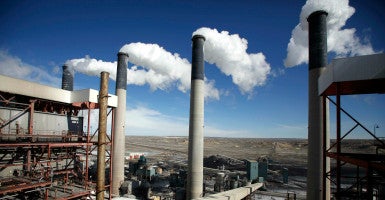The Environmental Protection Agency has overstepped its legal authority by imposing a regulatory agenda on the states, environmental officials at the state level testified Wednesday to a Senate committee.
Randy Huffman, cabinet secretary at the West Virginia Department of Environmental Protection, testified that the EPA’s flood of environmental regulations since President Barack Obama took office in 2009 chipped away at the Founding Fathers’ intent of “cooperative federalism” between the national and state governments.
Instead of consulting state regulators when establishing new policies, Huffman said, EPA bureaucrats increasingly are imposing regulations through what is called federal guidance.
“There’s two problems with this: EPA guidance further eliminates state discretion, and it allows them to avoid the accountability and transparency of rulemaking,” Huffman testified before the Senate Committee on Environment and Public Works.
When Congress passed the Clean Air Act more than 40 years ago, Huffman said, lawmakers put states in charge of establishing procedures to meet federal standards. In fact, over 95 percent of the environmental regulatory duties in the U.S. are carried out by the states, he said, citing the Environmental Council of the States.
The West Virginia official said Congress placed the primary responsibility with the states because lawmakers knew that state authorities would be more knowledgeable of local environments than D.C. bureaucrats. Rather than following congressional intent, he said, EPA regulators seized authority from the states.
“In the past seven years, states have been forced to digest more of these federal takeovers … than were ever served in the prior three federal administrations combined 10 times over,” Becky Keogh, director at the Arkansas Department of Environmental Quality, testified.
Keogh said the EPA’s Clean Power Plan, regulations on the coal industry designed to cut carbon emissions, is illustrative of the diminishment of state sovereignty.
“The reality is that states are more pawn than partner,” she said.
Sen. Jim Inhofe, R-Okla., who chairs the Committee on Environment and Public Works, noted that the amicus brief he and 33 other senators along with 171 House members filed against the plan last month at the D.C. Circuit Court of Appeals.
In the court papers, the lawmakers argued that the plan violates the Clean Air Act by coercing states to implement the EPA’s policies.
In early February, the Supreme Court halted the EPA’s implementation of the Clean Power Plan until legal challenges from more than two dozen states, four state agencies, and dozens of industry groups made their way through federal appeals court.
Deborah Markowitz, secretary of the Vermont Agency of Natural Resources, lauded the EPA’s hand in establishing federal baselines for environmental policies.
Without minimum standards, she said, states that put more effort toward creating environmental policies still would bear the consequences from neighboring states that choose to do less.
“National environmental regulations establish an even playing field between states, helping to prevent a regulatory race to the bottom in a misguided attempt to attract economic development,” Markowitz testified.
West Virginia’s Huffman agreed that federal standards should be recognized, but said currently states are not given enough flexibility to determine how to meet those standards. Further, he said EPA creating those regulations through executive “fiat” imposed on states without local input.
“The real problem for me as a regulator is the way [EPA] is going about implementing these standards,” he said. “They are bypassing the guidelines under the federal environmental statutes on how to implement changes.”
































One Reply to “State Environmental Officials Say Obama’s EPA Has Overstepped Its Authority”